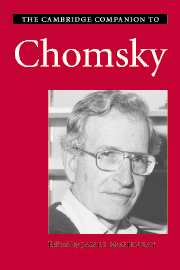Book contents
- Frontmatter
- Introduction
- Part I Chomsky on the human language
- 1 Chomsky’s science of language
- 2 Plato’s Problem, UG, and the language organ
- 3 Grammar, levels, and biology
- 4 How the brain begets language
- 5 Chomsky and Halle’s revolution in phonology
- 6 Universal aspects of word learning
- Part II Chomsky on the human mind
- Part III Chomsky on values and politics
- Notes
- References
- Index
1 - Chomsky’s science of language
from Part I - Chomsky on the human language
Published online by Cambridge University Press: 28 May 2007
- Frontmatter
- Introduction
- Part I Chomsky on the human language
- 1 Chomsky’s science of language
- 2 Plato’s Problem, UG, and the language organ
- 3 Grammar, levels, and biology
- 4 How the brain begets language
- 5 Chomsky and Halle’s revolution in phonology
- 6 Universal aspects of word learning
- Part II Chomsky on the human mind
- Part III Chomsky on values and politics
- Notes
- References
- Index
Summary
Language makes us human.
Whatever we do, language is central to our lives, and the use of language underpins the study of every other discipline. Understanding language gives us insight into ourselves and a tool for the investigation of the rest of the universe. Martians and dolphins, bonobos and bees, may be just as intelligent, cute, adept at social organization, and morally worthwhile, but they don't share our language, they don't speak “human.” One of Chomsky’s achievements is to have demonstrated that, despite the easily observable richness of the world’s languages, there is really only one human language: that the complex and bewildering array of different languages surrounding us are all variations on a single theme, most of whose properties are innately given.
The scientific study of language
Linguistics is conventionally defined as the “scientific study of language” - “language” in the singular. Although its domain is usually taken to include not just the wealth of the world’s languages - Amharic, Berber, Chinese, Dutch, English, etc. - but also all possible languages, past, present, and future, for Chomsky the focus of linguistics is the study of knowledge of language, of “human.” This chapter will attempt to justify and explain this emphasis, spell out its implications, and motivate the description of his linguistics as “scientific.”
- Type
- Chapter
- Information
- The Cambridge Companion to Chomsky , pp. 21 - 41Publisher: Cambridge University PressPrint publication year: 2005



